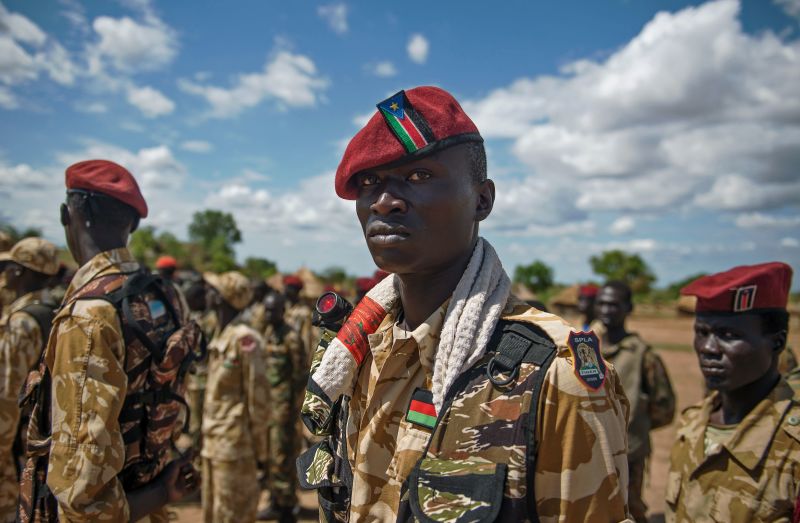Questioning the Chemical Weapons Narrative in Sudan

When it comes to international conflicts, the narrative is often dominated by the loudest voices, typically those of powerful nations and organizations. The recent allegations by U.S. officials that Sudan's military has used chemical weapons against the Rapid Support Forces (RSF) have sparked outrage and concern globally. However, it's crucial to pause and critically examine these claims rather than accept them at face value.
The use of chemical weapons is a grave accusation, and its implications are severe. However, this isn't the first time such allegations have been made in conflict zones, leading to significant global backlash and intervention. It's important for us to critically analyze these claims and consider the broader geopolitical context.
The Complexity of Evidence in Conflict Zones
Proving the use of chemical weapons in a war-torn region like Sudan is notoriously challenging. The alleged incidents occurred in remote areas, making independent verification difficult. The lack of concrete evidence raises questions about the reliability of these claims. Historically, similar accusations have often been based on dubious or incomplete information. For instance, the 2003 Iraq War was predicated on the existence of weapons of mass destruction, which were never found.
The U.S. officials’ claims should be scrutinized, especially considering the complexity of the situation on the ground. Sudan is embroiled in a multifaceted conflict with numerous actors and interests. The RSF itself has been accused of human rights abuses, including attacks on civilians, as reported by Amnesty International. Understanding the motivations behind these accusations requires a nuanced view of the broader conflict dynamics.
Geopolitical Motivations
It's essential to consider the geopolitical motivations behind these allegations. The United States, among other Western nations, has a vested interest in influencing the outcome of the Sudanese conflict. Sanctions have been imposed against Sudan's military chief, General Abdel Fattah al-Burhan, in response to these allegations. But are these sanctions purely about human rights, or do they serve a larger strategic purpose?
The U.S. has a history of using human rights narratives to justify interventions or exert pressure on nations that do not align with its strategic interests. For example, in Libya, the intervention was largely justified on humanitarian grounds, but the aftermath has been chaotic, with the country still struggling to achieve stability (BBC). In Sudan's case, the allegations of chemical weapons could be part of a broader strategy to destabilize a government that is not aligned with Western interests.
The Role of Media and Public Perception
Media plays a crucial role in shaping public perception of international conflicts. Often, stories are presented without the necessary context, leading to a one-sided view of events. The narrative surrounding Sudan has largely focused on the atrocities committed by the military, painting a picture of a clear villain and victim. However, this oversimplification ignores the complexity of the conflict and the culpability of various actors, including the RSF.
The international media's focus on chemical weapons might divert attention from other pressing issues in Sudan, such as the severe humanitarian crisis affecting millions of people. The United Nations reports that the conflict has displaced over 11 million people and has caused a famine affecting large parts of the population. Addressing these issues requires a comprehensive understanding of the conflict, beyond the simplistic narrative of good versus evil.
The Human Cost of Conflict
The ongoing conflict in Sudan has had devastating effects on the civilian population. While the focus has been on chemical weapons, it's crucial to remember the broader impact of the war. Indiscriminate bombings, destruction of infrastructure, and the collapse of basic services have led to one of the worst humanitarian crises in recent history.
Efforts to address these issues should prioritize humanitarian aid and conflict resolution rather than punitive measures like sanctions, which often exacerbate the suffering of civilians. The international community should focus on facilitating dialogue and peace negotiations between the conflicting parties, rather than escalating tensions through unverified allegations and punitive actions.
Conclusion
As the world reacts to the allegations of chemical weapons use in Sudan, it's vital to maintain a critical perspective. The complexity of the conflict, the motivations of global powers, and the role of media narratives must all be considered. Rather than rushing to judgment, the international community should focus on comprehensive solutions that prioritize the well-being of Sudan's people.
The situation in Sudan is a reminder that international conflicts are rarely black-and-white. To truly address the root causes of such crises, we must move beyond simplistic narratives and engage with the complex realities on the ground.

Screen Studio
Beautiful Screen Recordings in Minutes. Screen Recorder producing high-impact videos automatically. Designed for macOS.


